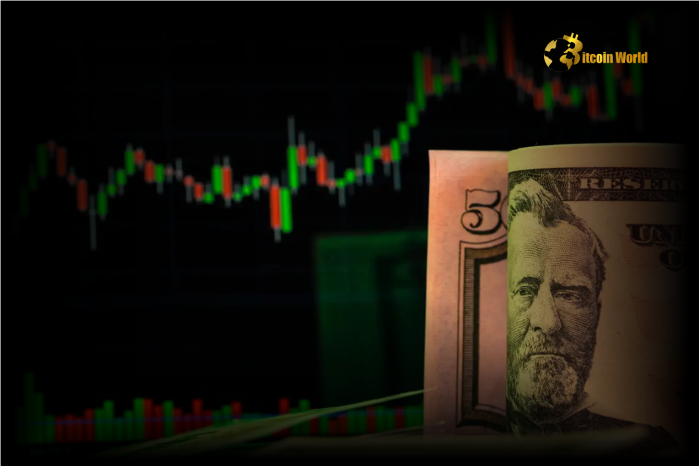The Dollar Index (DXY), a key metric that tracks the value of the U.S. dollar against a basket of six major currencies, has surged to 109.18 points, according to Coinness Market Monitoring. This marks a significant continuation of the dollar’s upward trajectory, driven by economic and monetary policy factors. The strengthening of the dollar has broad implications for global financial markets, influencing everything from commodity prices to emerging market economies.
What Is the Dollar Index?
The Dollar Index (DXY) measures the performance of the U.S. dollar relative to six major world currencies:
- Euro (EUR): Accounts for approximately 57.6% of the index.
- Japanese Yen (JPY): Contributes about 13.6%.
- British Pound (GBP): Makes up 11.9%.
- Canadian Dollar (CAD): 9.1%.
- Swedish Krona (SEK): 4.2%.
- Swiss Franc (CHF): 3.6%.
An increase in the DXY indicates a strengthening dollar, while a decline signals a weakening dollar.
Key Drivers Behind the Dollar Index Surge
Hawkish Monetary Policy
The Federal Reserve’s commitment to controlling inflation through higher interest rates has boosted the appeal of the U.S. dollar as a safe-haven asset.
Global Economic Uncertainty
Ongoing geopolitical tensions and recession fears in other economies have heightened demand for the dollar, which is viewed as a global reserve currency.
Weakness in Rival Currencies
- Euro: The Eurozone faces economic stagnation and energy crises, limiting the euro’s strength.
- Yen: Japan’s continued accommodative monetary policy contrasts sharply with the Fed’s tightening stance.
Impact of the Rising Dollar Index
Commodities Under Pressure
The strengthening dollar makes dollar-denominated commodities like gold and oil more expensive for holders of other currencies, often leading to price declines.
Emerging Markets Vulnerable
A stronger dollar increases the burden of dollar-denominated debt in emerging markets, potentially slowing economic growth.
International Trade Imbalances
A rising dollar can make U.S. exports less competitive, impacting trade balances and corporate earnings for multinational companies.
Market Implications
Forex Markets
- Euro/USD: Likely to remain under pressure as the dollar strengthens.
- USD/JPY: Could see further gains if the Bank of Japan maintains its dovish stance.
Equities
U.S. equities, particularly export-oriented sectors, may face headwinds as a stronger dollar erodes overseas revenue.
Cryptocurrency Market
A rising dollar often correlates with bearish trends in cryptocurrencies as investors flock to traditional safe-haven assets.
Outlook for the Dollar Index
Short-Term
The DXY could continue its upward trajectory if the Federal Reserve maintains its hawkish stance and rival economies struggle with stagnation.
Long-Term
The dollar’s strength may face resistance if global economic conditions stabilize or if the Fed signals a pause in rate hikes.
FAQs
What is the current level of the Dollar Index?
The Dollar Index is currently at 109.18 points, reflecting continued strength.
Why is the Dollar Index rising?
Key factors include hawkish Fed policies, global economic uncertainty, and relative weakness in rival currencies like the euro and yen.
How does a strong dollar impact emerging markets?
A strong dollar increases the cost of dollar-denominated debt for emerging markets, potentially slowing their economic growth.
What does a rising DXY mean for commodities?
A higher DXY typically puts downward pressure on commodity prices as they become more expensive for holders of other currencies.
Can the Dollar Index keep rising?
The DXY could rise further if the Federal Reserve continues its hawkish stance and global economic challenges persist.
How does the Dollar Index affect cryptocurrency?
A rising dollar often leads to bearish trends in cryptocurrencies as investors prefer the relative safety of the dollar.
Conclusion
The Dollar Index’s surge to 109.18 points underscores the continued dominance of the U.S. dollar amid global economic uncertainty and aggressive monetary policy by the Federal Reserve. While this strength benefits some sectors, it poses challenges for commodities, emerging markets, and international trade. Investors should closely monitor the DXY and its potential ripple effects across financial markets.
To learn more about the innovative startups shaping the future of the crypto industry, explore our article on latest news, where we delve into the most promising ventures and their potential.
Disclaimer: The information provided is not trading advice, Bitcoinworld.co.in holds no liability for any investments made based on the information provided on this page. We strongly recommend independent research and/or consultation with a qualified professional before making any investment decisions.




